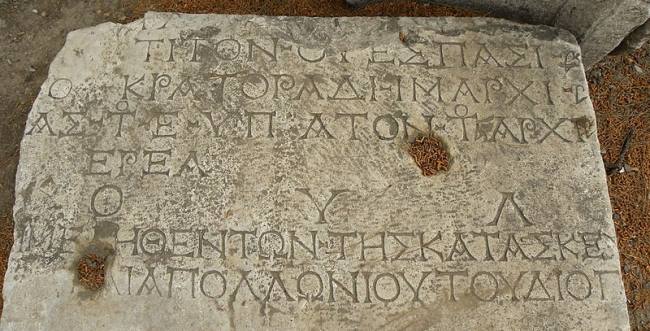Location and Importance of Thyatira
Located on the Izmir – Istanbul road, Akhisar District was founded on the ancient city of Thyateira also known as Thyatira, whose history dates back to the early bronze age. The city was understood to have been a weaving center producing items such as fabrics, carpets, and clothes in antiquity. Thyateira was also important in terms of military and trade, as it was at a crossroads in the region. During the Roman period, it was used as a summer resort where retired commanders spent their lives.

The most important industry in Thyateira was textiles. Within the scope of the textile industry, wool production, fabric dyeing, and linen production were developed. There were associations established by the employees in this line of business. The mention of the word “ergastai” meaning slave trader in two inscriptions found in Thyateira suggest that there may have been a slave market in the city during ancient times.
History and Meaning of Thyatira
The city of Thyateira is one of the most important settlements of the Lydian region and the Pergamon Kingdom. During the Roman Empire, until the Byzantine period, the city was called by name of Thyateira. Stephanus Byzantinus claimed that the word ‘Thygater’ means ‘girl’ and that the city was named ‘Thyateira’ by Seleukos the First, who was informed that he had a daughter while fighting Lysimachos during post Alexander the Great era wars.
Thyateira was one of the settlements with a strong economy of the Roman period, located on important road routes’ conjunction, with a large population. The most important reason why this city is so well known around the world is that one of the seven letters was written to the seven churches of Asia Minor and also the longest letter was written to Thyateira.
Thyatira and Christianity
Today, a basilica structure has been found in the city. Its walls are 4 to 5 meters. The inner part of the structure is in the form of an apse which makes the building similar to a church. It should be noted that the physical building of the Thyateira Church, one of the first seven churches mentioned in the Holy Bible, probably has not yet been found. This structure used for rituals can be any structure. Even if this structure was found, it would be very difficult to prove that it was the actual congregation’s meeting spot during the time of Saint John the Evangelist or Apostle Paul.
The name Thyateira is mentioned in two places in the Holy Bible, and also the names of Lydia and Jezebel are mentioned who were two Thyateiran women. In the Acts of the Apostles, it is mentioned about a faithful and hospitable woman named Lydia, an intelligent, hardworking, and honest merchant from Thyateira. She was baptized by Apostle Paul in Philippi of Macedonia. Lydia is believed to be the first person known to have converted to Christianity in Europe. The other Thyateiran woman is Jezebel. It is told in the Bible that Jezebel declared herself a prophet, encouraged the people to prostitute themselves, and led the people to eat the meat of animals dedicated to the pagan gods.
Especially during the Roman Empire’s reign, Thyateira became a remarkable agricultural and industrial center. It is also known that during the Roman period, Roman merchants were engaged in activities especially in Thyateira, as in other parts of Western Anatolia. Merchants created a very rich union in Thyateira. It is known that this union had some buildings built in the city.
Letter to the Church at Thyatira
“To the angel of the church in Thyatira write:
These are the words of the Son of God, whose eyes are like blazing fire and whose feet are like burnished bronze. I know your deeds, your love and faith, your service and perseverance, and that you are now doing more than you did at first.
Nevertheless, I have this against you: You tolerate that woman Jezebel, who calls herself a prophet. By her teaching she misleads my servants into sexual immorality and the eating of food sacrificed to idols. I have given her time to repent of her immorality, but she is unwilling. So I will cast her on a bed of suffering, and I will make those who commit adultery with her suffer intensely, unless they repent of her ways. 2I will strike her children dead. Then all the churches will know that I am he who searches hearts and minds, and I will repay each of you according to your deeds.
Now I say to the rest of you in Thyatira, to you who do not hold to her teaching and have not learned Satan’s so-called deep secrets, ‘I will not impose any other burden on you, except to hold on to what you have until I come.’
To the one who is victorious and does my will to the end, I will give authority over the nations— that one ‘will rule them with an iron sceptre and will dash them to pieces like pottery’—just as I have received authority from my Father. I will also give that one the morning star. Whoever has ears, let them hear what the Spirit says to the churches.”
Hire Licensed Tour Guide for Thyateira Church and Thyateira Ancient City
Thyateira the Misled Church has one of the most interesting and meaningful stories in the Holy Bible. The long letter which was written to Thyateira tells us about two opposing characters called Lydia and Jezebel at the same time. Contact me to learn more about Thyateira Church, Thyateira ancient city, and the Seven Churches of the Revelation in Asia Minor. Contact me to hire a tour guide for Thyateira and the Seven Churches tour. See you soon, Hasan Gülday.